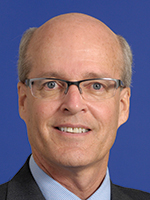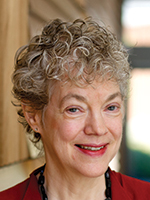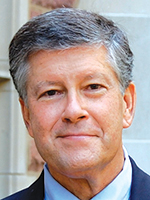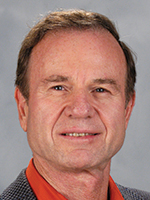2016 APS Mentor Awards
The APS Mentor Award recognizes those who have significantly fostered the careers of others, honoring APS members who masterfully help students and others find their own voices and discover their own research and career goals. Four psychological scientists have been selected to receive the 2016 APS Mentor Award.

Richard N. Aslin
Richard N. Aslin
University of Rochester
Many psychological scientists know APS Fellow Richard N. Aslin as an expert in perceptual development, specifically concerning implicit or “statistical” learning among infants. He studies the mechanisms that allow infants to observe regularities in speech and visual scenes and eventually extract meaning from those patterns. For this work, Aslin has received honors including the APA Distinguished Scientific Contributions Award and a Guggenheim Fellowship.
What many people who admire Aslin’s academic achievements might not know is that he also is an outstanding mentor — one who goes to remarkable lengths to nurture junior researchers inside and outside of the lab.
“When I had to undergo shoulder surgery,” writes Aslin’s former postdoc Vikranth Rao Bejjanki, now a postdoc at Princeton University, “Dick and his wife Pat followed up on my progress every day and even visited me at my home with ice cream and homemade brownies.” And, Bejjanki continues, Aslin “was among the first to congratulate me on finishing my first marathon.”
In 15 letters recommending Aslin for the APS Mentor Award, mentees praised Aslin’s efforts to build a community of his colleagues and students, creating and strengthening bonds by organizing activities such as bowling nights, canoe trips, softball games, and curling matches.
“From Day 1,” writes Aslin’s former graduate student Bob McMurray, now an associate professor at the University of Iowa, Aslin “teaches students that being a scholar isn’t a job, it’s a vocation; that your relationship with your students is life changing; that scholarship is something that can happen in the office and at the breakfast table.”
Indeed, Aslin looks for inspiration everywhere and in everyone. He invites eager undergraduates and high school students into his lab to learn how to do psychological science — and he never discounts anyone’s ideas. In their nomination letters, many of Aslin’s mentees wrote admiringly that he talks to junior researchers and students about their ideas as enthusiastically as he does when speaking with more established senior peers.
Robin Panneton, an associate professor at Virginia Tech, met Aslin when he visited the University of North Carolina, where she was a graduate student at the time. She still remembers how much Aslin’s interest in her work meant. Aslin invited Panneton to interview for a postdoctoral fellowship at Indiana University, and after the interview and laboratory tour, as Panneton puts it, “something incredible happened. Dick indicated that he needed to attend a faculty meeting, and that I should sit in his office and write a postdoctoral grant while he was gone.” Panneton was “terrified, never having written a grant,” and felt somewhat intimidated by the depth of Aslin’s knowledge of psychological science. But when Aslin came back to his office, he read the proposal and said, “Great! Let’s submit this.” They did, and Panneton’s postdoctoral work under Aslin was funded by the National Institutes of Health.
Panneton and others mentored by Aslin write gratefully about his willingness to show them the ropes of the grant application process and his frequent reminders that without money, research can’t happen. Equally, they express thanks for his example as a productive and integrative researcher who reaches across disciplinary boundaries to craft “an exciting research program that spans several different subfields of cognitive and developmental psychology,” as APS Fellow Scott P. Johnson, a professor at the University of California, Los Angeles, explains in his nomination letter.
Aslin is “a mentor for the delicate balance between work and life, and time management,” Johnson writes. “He cares about us both as scientists and as people.” Time and again, those lucky enough to experience Aslin’s guidance early in their careers insist that his mentorship made all the difference.

Susan T. Fiske
Susan T. Fiske
Princeton University
APS Fellow Naomi Ellemers met Susan T. Fiske in the 1980s. Ellemers was finishing her PhD at the University of Groningen, the Netherlands, when Fiske — already a renowned voice in social psychology — visited to teach a workshop. Ellemers recalls that despite her own junior status, Fiske immediately took a warm, genuine interest in Ellemers’s life and work.
Ellemers found Fiske’s attention striking in an era when many European social psychologists felt somewhat insecure about their work, afraid they were lagging behind their counterparts in North America.
“Several US colleagues contributed to that feeling, expressing very little interest in the topics European social psychologists were working on and little confidence in the scientific quality of our efforts,” Ellemers writes in her letter nominating Fiske for the APS Mentor Award.
But, Ellemers continues, “Susan was different. She reached out, invited European scholars to her lab, made sure she knew who was who and what we were working on, and generally made herself available to us.”
Ellemers, now Distinguished Professor at Utrecht University, the Netherlands, credits Fiske’s confidence and advice with shaping her career — and Fiske’s letters of recommendation with opening doors for her.
Many of Fiske’s mentees describe her as someone who is always available and never fails to provide timely feedback to students. Amy J. C. Cuddy, an associate professor at the Harvard Business School who earned her PhD under Fiske, marvels, “now that I am advising my own graduate students … I am finding it to be the most challenging part of my job, and now, more than ever, I cannot comprehend how Susan manages to simultaneously be a prolific researcher and such an exceptional mentor to her graduate students.”
Fiske sees graduate-student advising as “the most important part of her job,” Cuddy writes. And it is not lost on Cuddy — or on any of Fiske’s graduate students — that this is an incredible commitment for a leading scientist whose research on stereotyping, prejudice, and discrimination has been recognized with the APS William James Fellow Award, a Guggenheim Fellowship, membership in the National Academy of Sciences, and dozens of other accolades. An APS Past President, Fiske also has taken on significant service activities as a leader in professional organizations and as an editor.
Students of Fiske share the opportunities of the vast professional network that her academic and community involvements have afforded her. She attends as many conferences as she can, her mentees report, and uses these events as chances to introduce her students to new colleagues.
Fiske’s mentees also express a deep appreciation of her unfailing confidence in their abilities. When Lasana T. Harris interviewed with Fiske for a position in Princeton’s PhD program in psychology, Fiske told Harris that she had him in mind as a candidate for training in cognitive neuroscience and social psychology. “I had never done a real ‘hard science’ class since I was 14,” writes Harris, who is now a senior lecturer in social cognition at University College London, United Kingdom. Yet with Fiske’s encouragement, Harris mustered “the bravery and determination to try to master magnet physics, neurobiology, and even electrophysiology” as a student of cognitive neuroscience — a goal he is grateful to have undertaken and achieved.
As Harris’s story suggests, Fiske has a particular knack for seeing her mentees’ strengths. More importantly, she makes her mentees see their own strengths, too. As Michael S. North, an assistant professor at New York University’s Stern School of Business, puts it, “Imposter Syndrome is real, but Susan is the ultimate vaccine.”

Henry L. “Roddy” Roediger, III
Henry L. “Roddy” Roediger, III
Washington University in St. Louis
APS Past President Henry L. “Roddy” Roediger, III, once made a rather unusual request of one of his graduate students: He asked the nervous first-year to dress up in a gorilla suit and jump up onstage at an APS Annual Convention as part of a keynote address delivered by Roediger’s mentor, APS William James Fellow Endel Tulving.
“I must admit that my first thought was that Roddy surely considered me a dope,” shares Andrew Butler, now an assistant professor at the University of Texas at Austin. “However, I soon learned what a tremendous opportunity this odd role held. I got to interact with Endel Tulving and countless other thinkers in the vanguard of psychological science … Roddy opened a door for me, and he has done the same thing for countless others.”
Butler’s anecdote encapsulates a key component of Roediger’s mentoring technique: He takes active steps to further his students’ knowledge and career opportunities, even if those steps are not always conventional. Each letter of support contains similar memories of times when Roediger promoted the well-being of his mentees behind the scenes, often after they had left his lab — and in at least one case, even though the student had never officially worked under his guidance.
Another pillar of Roediger’s advisory approach is his strict adherence to good science and his insistence that his lab members be equally conscientious. Many of his mentees noted his ability to quickly parse students’ individual abilities and help them develop their strengths while addressing their weaknesses. Elizabeth J. Marsh, Duke University associate professor and associate chair, recalls that when she joined Roediger’s lab, he noticed she would benefit more from completing unfinished research (and from adding the as-yet unpublished results to her CV) than from taking on new projects. He devoted time and energy to helping her do just that, even offering to pay for a coder or other assistant to help organize the data. “Every student has a weakness (or multiple ones), and a good mentor will provide different support depending on what a student needs to improve,” Marsh notes.
Many of Roediger’s former mentees also write that he is still the first person they turn to when they face major decisions. Kristina R. Olson, assistant professor of psychology at the University of Washington, says she has continued to rely on Roediger since leaving his lab 12 years ago: “We meet up at conferences or in his office to discuss major life decisions — whether to take a faculty position, where to focus my research energies, and how to deal with collegial conflict. I have never made a major professional decision without his advice and hope not to.” Others echo these sentiments with memories of times when Roediger helped them navigate both academic and personal predicaments despite his demanding schedule and many duties.
As the myriad testimonials from Roediger’s former students, colleagues, and friends attest, he is not only a driving force in the field of psychological science but also a tremendously generous, exceptionally caring, and constantly encouraging mentor. Past APS Board Member Suparna Rajaram, associate dean for faculty affairs and personnel at the College of Arts and Sciences and professor in the Department of Psychology at Stony Brook University, sums it up in her letter of support: “[Roddy does] what one imagines the best advisors to do — he gives his students roots, and he gives them wings.”

Yaacov Trope
Yaacov Trope
New York University
In a world full of scholarly, social, and digital distractions, it would be understandable for any academic advisor to occasionally lose sight of some of his students’ needs or projects. Yet the most pervasive theme running throughout the letters of support for the nomination of APS Fellow Yaacov Trope for the APS Mentor Award is his constant and complete attention to each and every one of his mentees.
In fact, Trope’s legendary regard for his students has sometimes led even those outside his supervision to seek him out.
“In the first lab meeting that I attended, I [was] immediately struck by an observation that every senior graduate student that I admired and respected — the very best at NYU’s social psychology program at the time — was sitting in that room,” writes Kentaro Fujita, associate professor of psychology at The Ohio State University. “Most of them were not his primary students; instead, they were working on secondary projects with him or just interested in the high-level discussions that were common around the table. They were there because of the culture of openness, excellence, creativity, innovation, warmth, and nurturance that Yaacov cultivates.”
Others note that despite his obvious talent for attracting the best and brightest, Trope is remarkably modest, always focusing on the science rather than on his own achievements. He always insisted on rigorous experimental designs: “When data did not match the hypotheses, he always had an empathetic comment to soften my disappointment and then it was back to the drawing board to rectify the flaw in our theoretical model or weakness in our experimental approach,” recalls Kyle Ratner, assistant professor at the University of California, Santa Barbara. He added, “Yaacov was focused on the ideas and uncovering the truth. He wanted things done the right way and exuded a sense that if you worked hard and trusted the process then the results would come.”
Nira Liberman, Trope’s former graduate student who is now a professor at Tel Aviv University, Israel, says part of the secret to his success is his true passion for psychological science and his ability to inspire a similar passion in his students. “He loves experimental psychology,” Liberman writes. “He loves data and he loves theory. He thinks that what we are doing is important, and he makes his students think that what they are doing is important.”
Beyond being a scientific source of inspiration, write former mentees, Trope also shows concern for his students’ well-being outside the lab. Cheryl Wakslak, assistant professor of management and business at the University of Southern California Marshall School of Business, remembers Trope’s “unfailingly supportive” attitude when she chose to start a family in graduate school: “He never shifted resources; he never expressed doubt that I could make it work; he never did those small things that nudge women out of the academic pipeline.”
Most importantly, say Trope’s former students, they know that they can continue to turn to him with questions or concerns, sure that he will offer the same encouragement and insight into scientific reasoning that he did when they were working with him.
“These days (20 years later), when I meet Yaacov in his office at NYU, it is still a complete mystery to me how it is possible that he seems to have all the time in world to solve a problem with me,” writes APS Fellow Ayelet Fishbach, Jeffrey Breakenridge Keller Professor of Behavioral Science and Marketing at the University of Chicago Booth School of Business. “I conclude it’s because he deeply cares about these problems, so much that the rest of the world ceases to exist.” And perhaps even more importantly, “Yaacov actually thinks of his students as kin. We are children, siblings, aunts and uncles, and so on. It’s a rapidly growing and very welcoming family and it is making the future of research in experimental psychology.”





APS regularly opens certain online articles for discussion on our website. Effective February 2021, you must be a logged-in APS member to post comments. By posting a comment, you agree to our Community Guidelines and the display of your profile information, including your name and affiliation. Any opinions, findings, conclusions, or recommendations present in article comments are those of the writers and do not necessarily reflect the views of APS or the article’s author. For more information, please see our Community Guidelines.
Please login with your APS account to comment.